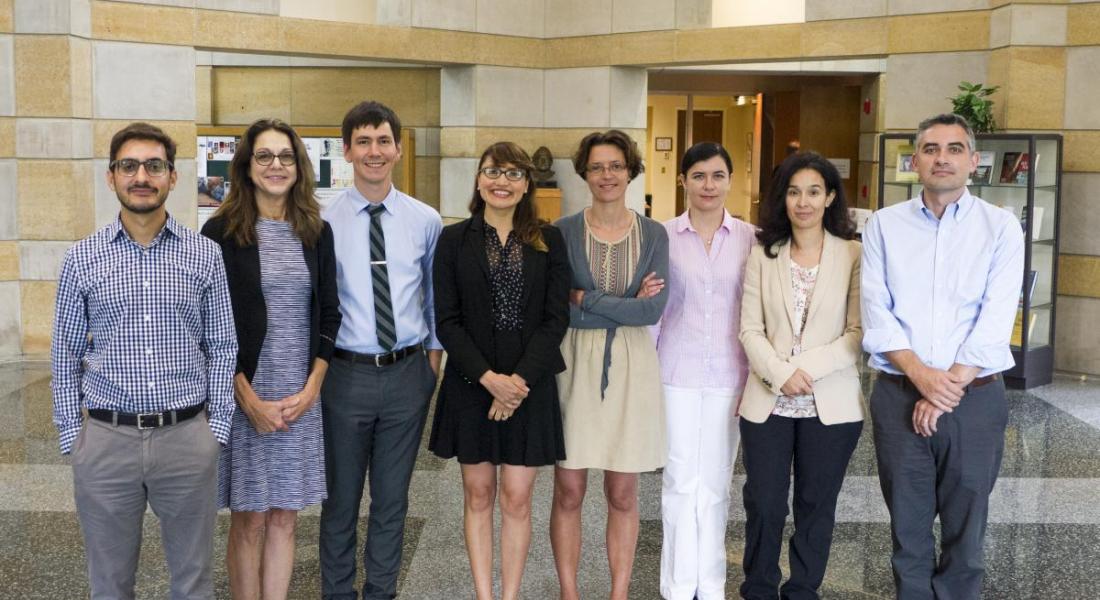
Ten visiting fellows have settled into their offices at the Kellogg Institute for International Studies, where they will conduct research on topics such as democratic accountability, migration, press freedoms, and the engagement of human development with religion in countries across Africa, Europe and Latin America.
With specializations spanning six disciplines, the nine scholars and one practitioner are based at academic institutions in Brazil, Great Britain, Portugal, and the United States.
“We’ve been blessed by an exceptional cohort of visiting fellows this year,” said Institute Director Paolo Carozza. “In inviting visiting fellows to join our intellectual community, we aspire to motivate and generate first-rate scholarship. This group’s work promises to do exactly that.”
Internationally recognized for research excellence, the Kellogg Visiting Fellow Program boasts a long list of distinguished former fellows. With the majority of fellowships for the academic year, the new visiting fellows will conduct independent research related to core Kellogg themes of democracy and human development.
- Catia Batista, an economist from Portugal’s Universidade Nova de Lisboa, is a cofounder and scientific director of the NOVAFRICA research center. In work based on lab-in-the-field and field experiments, she will focus on three projects related to migration between Sub-Saharan Africa and Europe.
- Katherine Corcoran, who joined the Institute as Hewlett Fellow for Public Policy last spring, has extended her stay at Kellogg. The former Associated Press bureau chief for Mexico and Central America, Corcoran is writing a book on violence against the press in Mexico. She will also contribute to the development of the Institute’s pilot Global Leadership Program.
- Séverine Deneulin, an international development scholar from the University of Bath, specializes in issues of development ethics, poverty, and inequality. She will conduct research on engaging development policy and practice with religious traditions, using Amartya Sen’s capability approach as a bridge between religion and development policy.
- Natalia Forrat is a sociologist from Northwestern University who studies contemporary authoritarian regimes. She is working on a book manuscript that demonstrates how Putin’s regime and Russian regional autocrats have utilized different state and civil society organizations to influence politics at the ground level.
- Peter Johannessen, a political scientist from Princeton University, draws on evidence from Brazil to explore how popular participation shapes the local policymaking process in developing countries. Based on extensive fieldwork, his book project explores the implications of local electoral behavior for theories of decentralization.
- Sandra Polanía-Reyes, an experimental economist from Pontifical Xavierian University in Colombia, uses large-scale economic experiments in the field to design and evaluate effective behavioral policy interventions in developing countries. At Kellogg, she will examine experimental evidence on cooperation in a variety of environments in Colombia.
- Gema Santamaría, a historian at Loyola University, Chicago, analyzes the history of Latin American processes of state building while focusing on violence, crime, justice, and the rule of law. She is working on a book manuscript that examines the persistence of lynching and extralegal justice as well as state formation in post-revolutionary Mexico.
- Luis Schiumerini, a political scientist from the University of Oxford, will draw on a year of fieldwork in Brazil, Argentina, and Chile to complete a book project that explores why incumbent politicians experience advantages or disadvantages in different political settings. He is also a postdoctoral research associate with Notre Dame’s Department of Political Science.
- Pedro Vicente, a development economist from Portugal’s Universidade Nova de Lisboa, is the founding scientific director of NOVAFRICA. Based on experimental evidence from Mozambique, he is studying the effect of social networks on political participation and investigating political accountability in the context of a major natural gas discovery.
- Francisco Correa Weffort, a political scientist from the University of São Paulo, holds the Brazilian Fulbright Distinguished Chair in Democracy and Human Development for the fall semester. Formerly Brazil’s Minister of Culture, he has held several previous Kellogg visiting fellowships. This semester, he will continue his study of social democratization and political democracy in Brazil.
See the complete list of 2017–18 Kellogg visiting fellows here. In the spring, Pedro Floriano Ribeiro of the Universidade Federal de Sao Carlos will hold the Brazilian Fulbright Distinguished Chair in Democracy and Human Development.
Research Spotlight Luncheon Coming Up
On Tuesday, September 26, scholars and doctoral students from around the University will have the opportunity to learn about the new visiting fellows’ projects in person at the Institute’s fall Research Spotlight Luncheon. Beginning at 12:30 p.m., each will give a two-minute overview of their research, and then be available individually in the Great Hall of the Hesburgh Center for International Studies with their project posters for more conversation.
Guest Scholars
Also in residence at the Institute are two guest scholars, who bring their own funding to their work in the Kellogg community.
- Tina Lee, a sociologist from Princeton University who is a former Kellogg visiting fellow, will spend the academic year working on a book project that explores the legacy of authoritarian governance on collusion between Chinese entrepreneurs and bureaucrats.
- Jorge Martínez Barrera, a philosopher from Pontificia Universidad Católica de Chile, will be in residence in November 2017 to study the philosophical, ethical, political, and social facets of solidarity. He also hopes to develop a joint project with Faculty Fellow Peter Casarella.
The Kellogg Institute for International Studies, part of the University of Notre Dame’s new Keough School of Global Affairs, is an interdisciplinary community of scholars and students from across the University and around the world that promotes research, provides educational opportunities, and builds linkages related to two topics critical to our world—democracy and human development.





